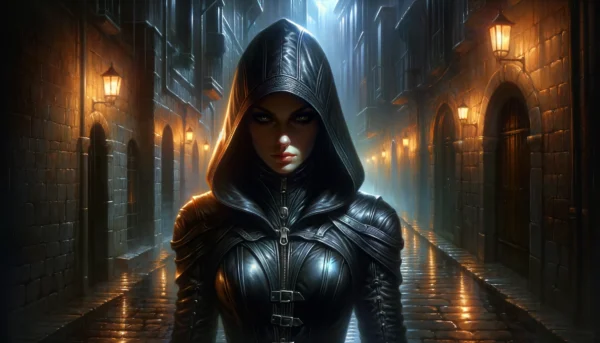
Rogue: Swashbuckler
Swashbuckler
Swashbuckler
Rogues who adopt the Swashbuckler archetype are the epitome of finesse and agility. These individuals revel in one-on-one combat and possess an almost uncanny ability to predict their opponents’ moves. With their rapier in one hand and their destiny in the other, these rogues carve a path of glory that few can parallel.
Subclass (Roguish Archetypes) of Rogue
Rogues are skilled and stealthy adventurers, masters of cunning and deception. They excel in the arts of infiltration, evasion, and surprise attacks, making them the ideal choice for espionage and thievery. Equipped with light armor and an arsenal of daggers, traps, and gadgets, rogues prefer to strike from the shadows and exploit their foes’ weaknesses. Their abilities allow them to sneak past guards unnoticed, disarm traps, and unlock doors, and perform sleight of hand, making them indispensable in non-combat situations. Agile, resourceful, and adaptable, rogues add a touch of mystery and versatility to any adventuring party.
Class Features
As a swashbuckler, you gain the following features.
Hit Points
Proficiencies
Armor: Light Armor
Weapon: Simple Weapon, hand crossbows, longswords, rapiers, shortswords
Tool: Thieves’ tools
Saving Throw: Dexterity, Intelligence
Skills: You have 4 of the following skills: Acrobatics, Athletics, Deception, Insight, Intimidation, Investigation, Perception, Performance, Persuasion, Sleight of Hand, Stealth.
Starting Gold
You start with 4d4 x 10 gold pieces (GP)
Starting Equipment
You start with the following equipment, in addition to the equipment granted by your background:
- (a) rapier or (b) shortsword
- (a) shortbow or (b) shortsword
- (a) burglar's pack or (b) explorer's pack or (c) dungeoneer's pack
- (a) leather armor or (b) (2x) dagger
- thieves' tools
Swashbuckler Features Table
| LVL | Pro+ | Features |
|---|---|---|
| 1st | +2 | Expertise, Sneak Attack, Thieves’ Cant |
| 2nd | +2 | Cunning Action |
| 3rd | +2 | Duelist's Grace, Parry and Riposte, Roguish Archetype |
| 4th | +2 | Ability Score Improvement |
| 5th | +3 | Uncanny Dodge |
| 6th | +3 | Expertise |
| 7th | +3 | Evasion |
| 8th | +3 | Ability Score Improvement |
| 9th | +4 | Predictive Strikes |
| 10th | +4 | Ability Score Improvement |
| 11th | +4 | Reliable Talent |
| 12th | +4 | Ability Score Improvement |
| 13th | +5 | Master Duelist |
| 14th | +5 | Blindsense |
| 15th | +5 | Slippery Mind |
| 16th | +5 | Ability Score Improvement |
| 17th | +6 | Unrivaled Finesse |
| 18th | +6 | Elusive |
| 19th | +6 | Ability Score Improvement |
| 20th | +6 | Stroke of Luck |
Class Features at Level
Expertise
Choose two of your skill proficiencies, or one of your skill proficiencies and your proficiency with thieves’ tools. Your proficiency bonus is doubled for any ability check you make that uses either of the chosen proficiencies.
Sneak Attack
You know how to strike subtly and exploit a foe’s distraction. Once per turn, you can deal an extra 1d6 damage to one creature you hit with an attack if you have advantage on the attack roll. The attack must use a finesse or a ranged weapon.
You don’t need advantage on the attack roll if another enemy of the target is within 5 feet of it, that enemy isn’t incapacitated, and you don’t have disadvantage on the attack roll.
The amount of the extra damage increases as you gain levels in this class, as shown in the Sneak Attack column of the Rogue table.
Thieves’ Cant
During your rogue training you learned thieves’ cant, a secret mix of dialect, jargon, and code that allows you to hide messages in seemingly normal conversation. Only another creature that knows thieves’ cant understands such messages. It takes four times longer to convey such a message than it does to speak the same idea plainly.
In addition, you understand a set of secret signs and symbols used to convey short, simple messages, such as whether an area is dangerous or the territory of a thieves’ guild, whether loot is nearby, or whether the people in an area are easy marks or will provide a safe house for thieves on the run.
Cunning Action
Your quick thinking and agility allow you to move and act quickly. You can take a bonus action on each of your turns in combat. This action can be used only to take the Dash, Disengage, or Hide action.
Duelist's Grace
Starting at 3rd level, when you engage in one-on-one combat with a creature, you gain a +2 bonus to AC against attacks made by that creature. This effect lasts until the start of your next turn or until you engage another creature.
Parry and Riposte
Also at 3rd level, when a creature misses you with a melee attack, you can use your reaction to make a melee attack against that creature.
Roguish Archetype
At 3rd level, you choose an archetype that you emulate in the exercise of your rogue abilities, such as Thief. Your archetype choice grants you features at 3rd level and then again at 9th, 13th, and 17th level.
Ability Score Improvement
You can increase one ability score of your choice by 2, or you can increase two ability scores of your choice by 1. As normal, you can’t increase an ability score above 20 using this feature. Alternatively, you can choose to take one Feat instead of the ability score increase.
Uncanny Dodge
When an attacker that you can see hits you with an attack, you can use your reaction to halve the attack’s damage against you.
Expertise
Choose two more of your skill proficiencies, or one of your skill proficiencies and your proficiency with thieves’ tools. Your proficiency bonus is doubled for any ability check you make that uses either of the chosen proficiencies.
Evasion
You can nimbly dodge out of the way of certain area effects, such as a red dragon’s fiery breath or an ice storm spell. When you are subjected to an effect that allows you to make a Dexterity saving throw to take only half damage, you instead take no damage if you succeed on the saving throw, and only half damage if you fail.
Ability Score Improvement
You can increase one ability score of your choice by 2, or you can increase two ability scores of your choice by 1. As normal, you can’t increase an ability score above 20 using this feature. Alternatively, you can choose to take one Feat instead of the ability score increase.
Predictive Strikes
Starting at 9th level, if you and your opponent both roll for initiative and you roll higher, you gain advantage on your first attack roll against that opponent.
Ability Score Improvement
You can increase one ability score of your choice by 2, or you can increase two ability scores of your choice by 1. As normal, you can’t increase an ability score above 20 using this feature.
Reliable Talent
You have refined your chosen skills until they approach perfection. Whenever you make an ability check that lets you add your proficiency bonus, you can treat a d20 roll of 9 or lower as a 10.
Ability Score Improvement
You can increase one ability score of your choice by 2, or you can increase two ability scores of your choice by 1. As normal, you can’t increase an ability score above 20 using this feature. Alternatively, you can choose to take one Feat instead of the ability score increase.
Master Duelist
At 13th level, once per turn when you miss an attack against a creature you’re dueling, you can reroll the attack roll. You must use the new roll.
Blindsense
If you are able to hear, you are aware of the location of any hidden or invisible creature within 10 feet of you.
Slippery Mind
You have acquired greater mental strength. You gain proficiency in Wisdom saving throws.
Ability Score Improvement
You can increase one ability score of your choice by 2, or you can increase two ability scores of your choice by 1. As normal, you can’t increase an ability score above 20 using this feature. Alternatively, you can choose to take one Feat instead of the ability score increase.
Unrivaled Finesse
At 17th level, your dueling abilities reach their zenith. When you successfully hit a creature you’re dueling, you can add your Charisma modifier to the damage roll as extra damage. Additionally, once per long rest, you can declare a “Champion’s Challenge.” For one minute, you gain resistance to all damage types from the creature you’re dueling and your attacks against that creature score a critical hit on a roll of 18–20.
Elusive
You are so evasive that attackers rarely gain the upper hand against you. No attack roll has advantage against you while you aren’t incapacitated.
Ability Score Improvement
You can increase one ability score of your choice by 2, or you can increase two ability scores of your choice by 1. As normal, you can’t increase an ability score above 20 using this feature. Alternatively, you can choose to take one Feat instead of the ability score increase.
Stroke of Luck
You have an uncanny knack for succeeding when you need to. If your attack misses a target within range, you can turn the miss into a hit. Alternatively, if you fail an ability check, you can treat the d20 roll as a 20.
Once you use this feature, you can’t use it again until you finish a short or long rest.
Roguish Archetypes
Rogues have many features in common, including their emphasis on perfecting their skills, their precise and deadly approach to combat, and their increasingly quick reflexes. But different rogues steer those talents in varying directions, embodied by the rogue archetypes. Your choice of archetype is a reflection of your focus—not necessarily an indication of your chosen profession, but a description of your preferred techniques.
Master of Shadows
Swashbuckler
Credits: Squire 5


